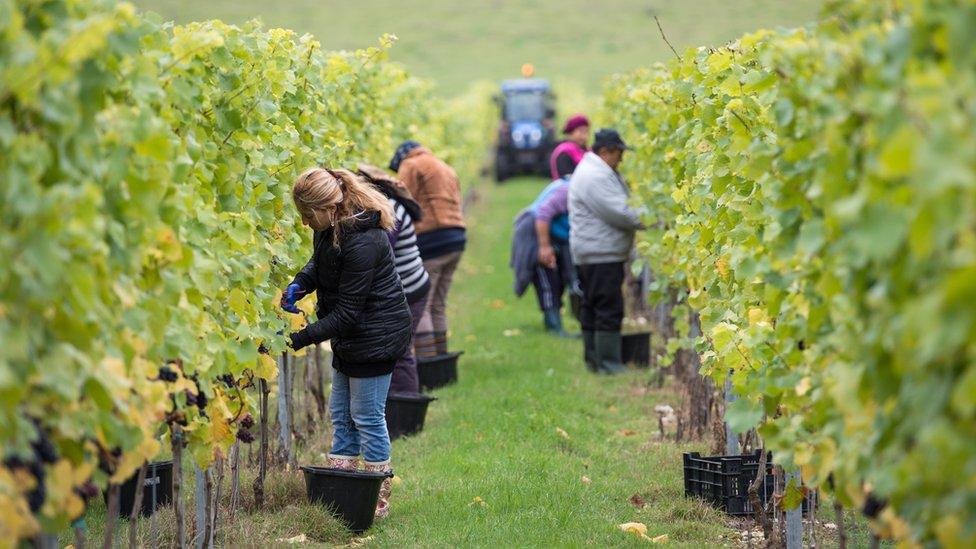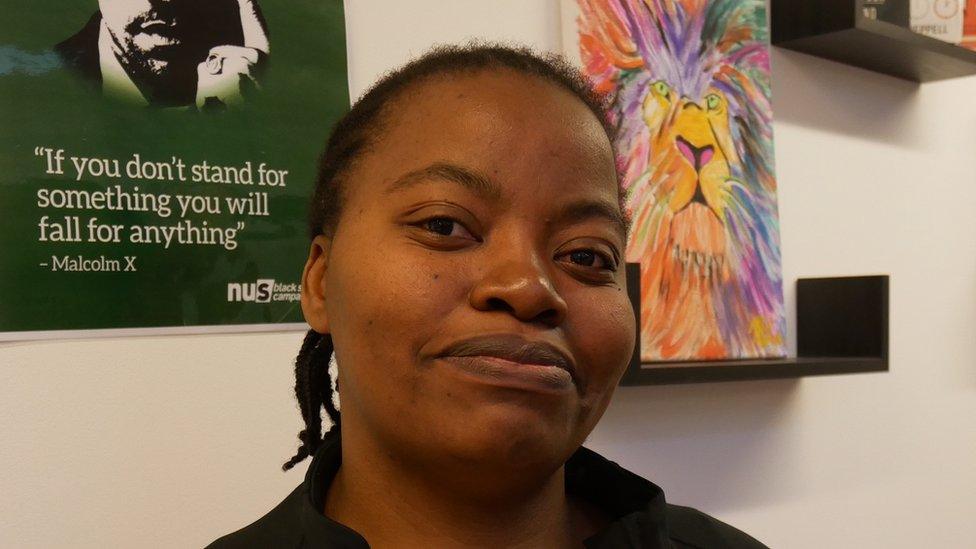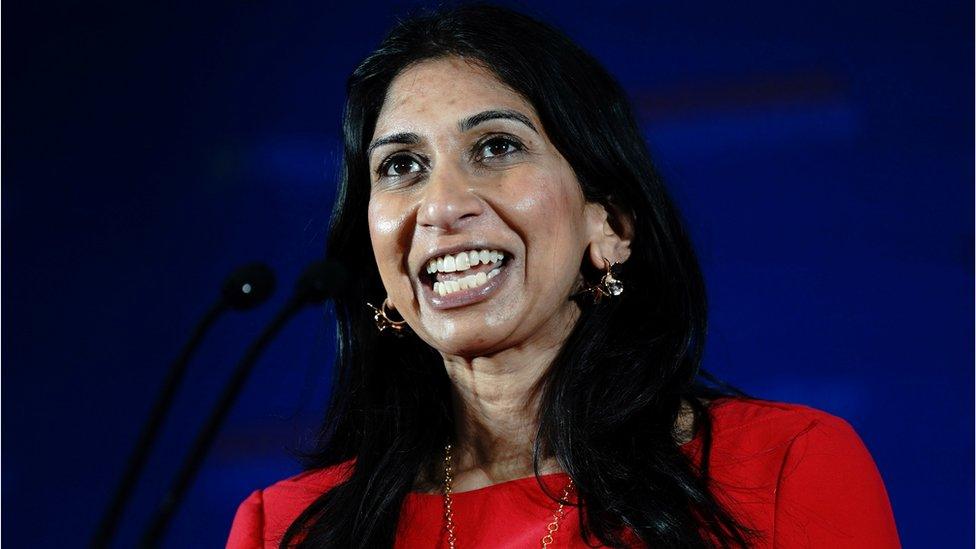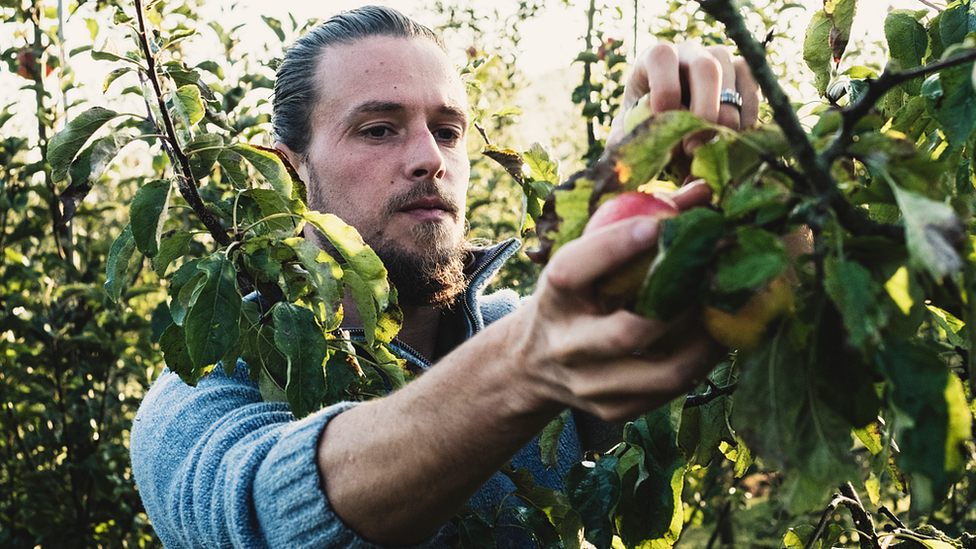Migrant fruit-pickers are skilled workers, says ex-minister George Eustice
- Published

Ministers must "completely reappraise" their immigration policy, a former environment secretary has told the BBC.
The government currently prioritises what it defines as "skilled workers" for migration to the UK.
People who are good with their hands like fruit-pickers should not be deemed "low-skilled", George Eustice said.
Home Secretary Suella Braverman has previously said there is "no good reason" why the UK can not train its own fruit-pickers to cut immigration.
In a BBC interview, the MP for Camborne and Redruth in Cornwall, a former strawberry farmer, said he "completely" disagreed - and the UK needed a long-term seasonal workers scheme, external.
He called for an immigration policy that responded to the needs of the economy rather than a "skills-based" system, but added: "If you're going to have 'skills', at least recognise the correct skills - and those are dextrous, human skills."
Farming minister Mark Spencer said the government was "committed to backing our farmers so we can enjoy the very best of British products, grow our economy and deliver the food security that we need".
He said 45,000 seasonal worker visas would again be made available to the horticulture sector next year, while £12.5m was being spent on research and development of automation and robotics to help improve productivity and sustainability.
"We continue to do all we can to encourage greater take up of farming and food sector roles including through our New Entrant Support Scheme, external," Mr Spencer added.
An independent review of labour shortages in the food supply chain, external, commissioned by Mr Eustice when he was environment secretary from 2020-2022 and published on Friday, also calls for a longer-term seasonal worker scheme, better training for UK workers and more automation.
It was led by John Shropshire, founder of one of the UK's largest fruit and vegetable suppliers, G's Fresh.
Separately, the Migration Advisory Committee - an independent body that advises the government on migration issues - is carrying out an inquiry into seasonal worker visas, external and seeking views on how well they meet the needs of employers, workers and other organisations.
In his interview, Mr Eustice said the government was "not defining skills correctly".
'Making inflation worse'
"It allows in people with cognitive skills - lawyers, accountants. But we have no shortage of those people.
"In the age of artificial intelligence, many of those jobs can be done by robots in future.
"At the other end of the scale, we don't allow in people with dextrous skills - these are the skills robots find hardest to do. People who work in food factories for instance."
Such jobs were also where there were "acute labour shortages", he added.
Mr Eustice said the government should "completely reappraise" what it defined as skills and introduce a temporary visa scheme lasting two to three years for sectors such as food processing, which had "acute labour shortages that are contributing to inflation".
These shortages, caused by not having enough migrant workers, were "exacerbating" the rate of inflation by contributing to higher food prices, along with rising energy costs, he argued.
Robots
"Perhaps up to a third of inflation that we're seeing in food is down to shortages of labour. That is driving up the cost of labour, affecting availability of output," he said.
He hoped the independent review would recognise that "dextrous skills [like fruit-picking] can actually be put on the skilled list and some of the professions such as lawyers and insolvency practitioners, the people we don't really need any more of, could be removed from that list".
Mr Eustice warned it might be "many years" before robots were capable of skills like fruit-picking.
"Robots find it easier to replace cognitive skills. You can train a robot to be a grand master of chess quite easily. You can't train a robot to be a fielder and catch a cricket ball.
"Those dextrous skills that humans have are actually quite difficult to replicate in robots," he said, adding that fruit-picking involved environments that were "too unpredictable and too variable".
Ms Braverman has insisted the UK can train its own fruit pickers and lorry drivers to bring down immigration. These sectors have suffered particular labour shortages following Brexit and the Covid pandemic.
Mr Eustice agreed that domestic workers should receive better training, but said he completely disagreed with the home secretary's main point.
"Every developed country in the world has seasonal worker schemes for agriculture. We're going to need to have a seasonal workers scheme for the long term, the next five years, probably longer," he said.
The government has said 45,000 visas for seasonal workers will be available in 2023, external, with the potential to increase that number by a further 10,000 if necessary.
A campaign to recruit more UK-based workers for seasonal farm roles was scrapped in 2021 after a relatively small number of people signed up.
- Published22 June 2023

- Published15 May 2023

- Published16 May 2023
